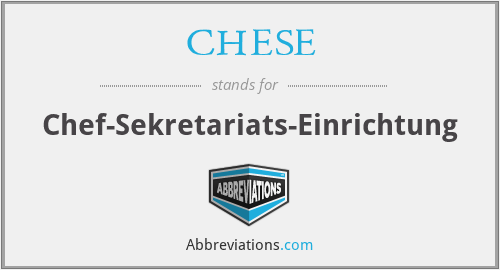What does CHESE mean in German?
This page is about the meanings of the acronym/abbreviation/shorthand CHESE in the International field in general and in the German terminology in particular.
Chef-Sekretariats-Einrichtung
Submitted by acronimous on August 31, 2016
Translation
Find a translation for Chef-Sekretariats-Einrichtung in other languages:
Select another language:
- - Select -
- 简体中文 (Chinese - Simplified)
- 繁體中文 (Chinese - Traditional)
- Español (Spanish)
- Esperanto (Esperanto)
- 日本語 (Japanese)
- Português (Portuguese)
- Deutsch (German)
- العربية (Arabic)
- Français (French)
- Русский (Russian)
- ಕನ್ನಡ (Kannada)
- 한국어 (Korean)
- עברית (Hebrew)
- Gaeilge (Irish)
- Українська (Ukrainian)
- اردو (Urdu)
- Magyar (Hungarian)
- मानक हिन्दी (Hindi)
- Indonesia (Indonesian)
- Italiano (Italian)
- தமிழ் (Tamil)
- Türkçe (Turkish)
- తెలుగు (Telugu)
- ภาษาไทย (Thai)
- Tiếng Việt (Vietnamese)
- Čeština (Czech)
- Polski (Polish)
- Bahasa Indonesia (Indonesian)
- Românește (Romanian)
- Nederlands (Dutch)
- Ελληνικά (Greek)
- Latinum (Latin)
- Svenska (Swedish)
- Dansk (Danish)
- Suomi (Finnish)
- فارسی (Persian)
- ייִדיש (Yiddish)
- հայերեն (Armenian)
- Norsk (Norwegian)
- English (English)
Definition
What does CHESE mean?
- chese
- Cheese is a dairy product produced in wide ranges of flavors, textures, and forms by coagulation of the milk protein casein. It comprises proteins and fat from milk (usually the milk of cows, buffalo, goats, or sheep). During production, milk is usually acidified and either the enzymes of rennet or bacterial enzymes with similar activity are added to cause the casein to coagulate. The solid curds are then separated from the liquid whey and pressed into finished cheese. Some cheeses have aromatic molds on the rind, the outer layer, or throughout. Over a thousand types of cheese exist and are produced in various countries. Their styles, textures and flavors depend on the origin of the milk (including the animal's diet), whether they have been pasteurized, the butterfat content, the bacteria and mold, the processing, and how long they have been aged. Herbs, spices, or wood smoke may be used as flavoring agents. The yellow to red color of many cheeses is produced by adding annatto. Other ingredients may be added to some cheeses, such as black pepper, garlic, chives, or cranberries. A cheesemonger, or specialist seller of cheeses, may have expertise with selecting, purchasing, receiving, storing and ripening cheeses.For a few cheeses, the milk is curdled by adding acids such as vinegar or lemon juice. Most cheeses are acidified to a lesser degree by bacteria, which turn milk sugars into lactic acid, then the addition of rennet completes the curdling. Vegetarian alternatives to rennet are available; most are produced by fermentation of the fungus Mucor miehei, but others have been extracted from various species of the Cynara thistle family. Cheesemakers near a dairy region may benefit from fresher, lower-priced milk, and lower shipping costs. Cheese is valued for its portability, long shelf life, and high content of fat, protein, calcium, and phosphorus. Cheese is more compact and has a longer shelf life than milk, although how long a cheese will keep depends on the type of cheese. Hard cheeses, such as Parmesan, last longer than soft cheeses, such as Brie or goat's milk cheese. The long storage life of some cheeses, especially when encased in a protective rind, allows selling when markets are favorable. Vacuum packaging of block-shaped cheeses and gas-flushing of plastic bags with mixtures of carbon dioxide and nitrogen are used for storage and mass distribution of cheeses in the 21st century. Plant-based cheese has a lower carbon footprint.
Embed
Citation
Use the citation below to add this abbreviation to your bibliography:
Style:MLAChicagoAPA
"CHESE." Abbreviations.com. STANDS4 LLC, 2024. Web. 25 Apr. 2024. <https://www.abbreviations.com/term/1811761>.



Discuss this CHESE abbreviation with the community:
Report Comment
We're doing our best to make sure our content is useful, accurate and safe.
If by any chance you spot an inappropriate comment while navigating through our website please use this form to let us know, and we'll take care of it shortly.
Attachment
You need to be logged in to favorite.
Log In